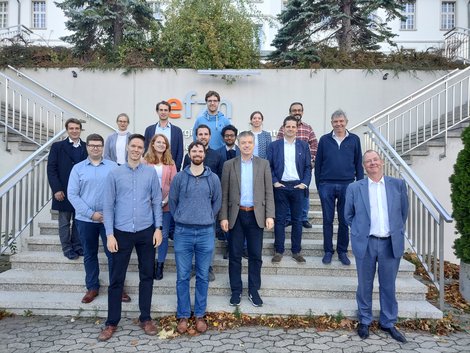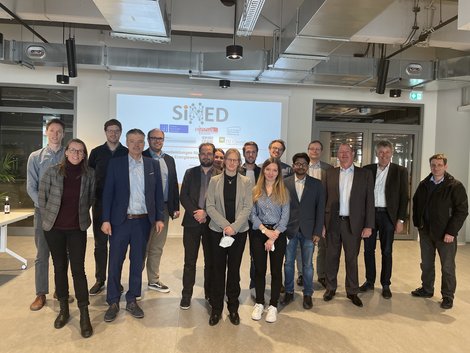Mid-term assessment and new beginnings in part 2
SiNED: Project meeting at the end of October 2022 at the EnergieCampus in Goslar
October 2022
The next SiNED project meeting took place at the end of October 2022 at the transition to the second funding phase. The participating researchers came together at the EnergieCampus in Goslar for a two-day workshop. The first day of the event was dedicated to a review of the first three years of the project (2019-2022). To this end, the scientific partners discussed the results achieved so far in the individual working groups in greater detail with the help of a poster session. In line with the project structure, this involved an interdisciplinary approach. To provide opportunity for personal networking among the researchers, a tour of the city of Goslar and a joint dinner concluded the first day of the workshop.
Which work packages are to be completed in the second funding phase, starting at the beginning of November 2022? The SiNED consortium focused on this question during the rest of the event. The Lower Saxony Ministry of Science and Culture, which is funding the project with funds from the Lower Saxony Advance, extended the term last summer until October 31, 2024. The research results achieved so far will be published next year in a joint publication for the ETG Congress 2023 (the ETG is the Energy Technology Society in the Association for Electrical, Electronic & Information Technologies, VDE) - in addition to coordinating the roadmap for the next two years, this is also a result of the project meeting in Goslar. "We look forward to continuing our successful collaboration with our project partners!" said the new project coordinator Cornelius Biedermann at the end of the meeting, also on behalf of SiNED spokesperson Professor Bernd Engel from TU Braunschweig.
In the efzn lead project SiNED, researchers from seven working groups in Lower Saxony are working on system services for the electricity system of the future. The universities of Braunschweig, Clausthal, Hanover and Oldenburg as well as the OFFIS - Institute for Information Technology Oldenburg and the DLR Institute of Networked Energy Systems (DLR-VE) are involved.
Contact:
Cornelius Biedermann, M.Sc.
Project coordinator SiNED
Technische Universität Braunschweig
elenia Institute for High Voltage Technology and Power Systems

Quarterly meeting of the consortium in Oldenburg
SiNED: First face-to-face meeting since project kick-off in March 2020
April 2022
The efzn lighthouse project SiNED has been underway since the end of 2019. Due to the COVID-19 pandemic, the consortium of scientists involved has only been able to meet online so far, apart from the project kick-off in March 2020. SiNED project coordinator Dr.-Ing. Jonas Wussow from the Technische Universität Braunschweig was therefore all the more pleased to welcome all participating research groups to the CORE Oldenburg conference rooms last week. This is where the first face-to-face meeting in the further course of the project took place with the quarterly meeting on April 28.
In the efzn lead project SiNED, researchers from seven working groups in Lower Saxony are working on system services for the electricity system of the future. The universities of Braunschweig, Clausthal, Hanover and Oldenburg as well as the OFFIS - Institute for Information Technology Oldenburg and the DLR Institute of Networked Energy Systems (DLR-VE) are involved.
Contact:
Dr.-Ing. Jonas Wussow
Project coordinator SiNED
Technische Universität Braunschweig
elenia Institute for High Voltage Technology and Power Systems
Email: j.wussow@tu-braunschweig.de
Cooperation in energy research
SiNED: Joint workshop with ZDIN/ZLE
February 2021
The ongoing energy transition is posing increasing challenges for the German electricity grid. Renewable energies will cover the growing demand for energy in the future. Digitalisation plays an important role in energy systems so that the electricity grids can continue to be operated safely even with fluctuating electricity generation from solar and wind power plants. Among other things, digitalisation helps to coordinate an increasing number of decentralized power sources.
Due to interests in these and other similar topics, it is hardly surprising that the Energy Research Center of Lower Saxony (efzn) and the Zentrum für digitale Innovationen Niedersachsen (ZDIN) have institutional overlaps. With the Technische Universität Braunschweig, the Leibniz University Hannover, the University of Oldenburg and the OFFIS Institute for Information Technology, institutions from three efzn locations are also involved in the ZDIN. In order to make even better use of the potential of this existing connection in the future, the idea of an exchange between the efzn project "SiNED", which deals with system services for secure power grids in times of advancing energy transition and digital transformation, and the Future Energy Laboratory (ZLE) of the ZDIN was born.
"In the Future Energy Lab, we're concerned with how we can improve cooperation in energy research through digitalisation - and that starts with meetings like this, which have given us all new momentum, not least for our future cooperation in Lower Saxony," said Professor Astrid Nieße, sub-project manager at ZDIN/ZLE at the University of Oldenburg.
The first part of the workshop consisted of brief presentations of the two projects and the individual work packages in the form of elevator pitches - pitches so short and concise that they only would have taken the duration of an elevator ride. This way, all participants were able to gain a brief, quick overview of the other project.
The second part took place in small groups. Using digital boards on which the results were noted, participants were able to brainstorm and have very active discussions in their individual groups. Working in small groups not only led to fundamental opportunities for collaboration, but also to very specific joint work packages, such as laboratory and simulation coupling or addressing the issue of multiple use of storage systems.
"It was very interesting to work out the similarities and differences between the two joint research projects. The discussions were definitely mutually beneficial," said Professor Bernd Engel from TU Braunschweig, spokesperson for the SiNED project.
A joint platform will be created for a continuous exchange in the future, where cross-project discussions can take place, among other things. Joint biannual meetings are also planned to consolidate the exchange.
To learn more about ZDIN, visit their website here .
Contact:
Dr.-Ing. Jonas Wussow
Project coordinator SiNED
Technische Universität Braunschweig
elenia Institute for High Voltage Technology and Power Systems
Email: j.wussow@tu-braunschweig.de
Evaluation of protection systems for temporary overvoltages in low-voltage networks
SiNED: First research results published
October 2020
As part of the efzn lead project "SiNED - System services for secure power grids in times of advancing energy transition and digital transformation", an evaluation of protection systems in grids with distributed converters in the event of temporary overvoltages (TOVs) was carried out.
Due to the increased integration of decentralized and converter-based power generation systems, the distribution grid is loaded asymmetrically. This can result in overvoltages that last for a long time and can cause damage to equipment.
The SiNED project investigated whether these temporary overvoltages also have an impact on the distribution grid and its protection systems, and to what extent legal parameters determine the permissible asymmetrical load on the grid and thus the level of temporary overvoltages.
Initial investigations show that asymmetrical loads are only permissible within certain limits due to corresponding regulations in such a way that the overvoltages possible in theory are not reached in practice, and below typical limit values of "√(3) ⋅ UREF".
The results can be viewed and downloaded on the website of the elenia Institute for High Voltage Technology and Power Systems at TU Braunschweig (PDF file). You can access this website here.
Contact:
TU Braunschweig
elenia Institute for High Voltage Technology and Power Systems

